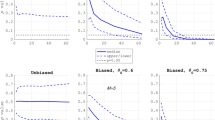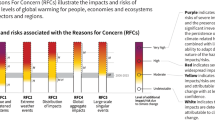Abstract
To what extent does economic analysis of climate change depend on low-probability, high-impact events? This question has received a great deal of attention lately, with the contention increasingly made that climate damage could be so large that societal willingness to pay to avoid extreme outcomes should overwhelm other seemingly important assumptions, notably on time preference. This paper provides an empirical examination of some key theoretical points, using a probabilistic integrated assessment model. New, fat-tailed distributions are inputted for key parameters representing climate sensitivity and economic costs. It is found that welfare estimates do strongly depend on tail risks, but for a set of plausible assumptions time preference can still matter.
Similar content being viewed by others
References
Ackerman F, Stanton EA et al (2009) Fat tails, exponents, and extreme uncertainty: simulating catastrophe in DICE. Stockholm Environment Institute Working Paper WP-US-0901
Anthoff D, Tol RSJ (2009) The impact of climate change on the balanced-growth-equivalent: an application of FUND. Environ Resour Econ 43(3):351–367
Aumann RJ, Kurz M (1977) Power and taxes. Econometrica 199:1137–1161
Costello CJ, Neubert MG et al (2010) Bounded uncertainty and climate change economics. Proc Natl Acad Sci 107(18):8108–8110
Dasgupta P (2007) Commentary: the Stern Review’s economics of climate change. Natl Inst Econ Rev 199:4–7
Foncel J, Treich N (2005) Fear of ruin. J Risk Uncertain 31(3):289–300
Heal G (2008) Climate economics: a meta-review and some suggestions for future research. Rev Environ Econ Policy 3(1):4–21
Henry C, Henry M (2002) Formalization and applications of the precautionary principle. Discussion Paper 2002009. Louvain, Belgium, Université Catholique de Louvain, Institut de Recherches Economiques et Sociales
Hope C (2006a) The marginal impact of CO2 from PAGE2002: an integrated assessment model incorporating the IPCC’s five reasons for concern. Integr Assess 6(1):19–56
Hope C (2006b) The social cost of carbon: what does it actually depend on? Climate Policy 6(5):566–572
Hope C (2008) Discount rates, equity weights and the social cost of carbon. Energy Econ 30(3):1011–1019
IPCC (2007) Summary for policymakers. In: Solomon S, Qin D, Manning M, Chen Z, Marquis M, Averyt KB, Tignor M, Miller HL (eds) Climate change 2007: the physical science basis. Contribution of working group I to the fourth assessment report of the intergovernmental panel on climate change. Cambridge University Press, Cambridge
Mastrandrea MD, Schneider SH (2004) Probabilistic integrated assessment of “dangerous” climate change. Science 304:571–575
Meehl GA, Stocker TF et al (2007) Global climate projections. In: Solomon S, Qin D, Manning M, Chen Z, Marquis M, Averyt KB, Tignor M, Miller HL (eds) Climate change 2007: the physical science basis. Contribution of working group I to the fourth assessment report of the intergovernmental panel on climate change. Cambridge University Press, Cambridge
Nakicenovic N, Swart R (eds) (2000) Special report on emissions scenarios: a special report of working group III of the intergovernmental panel on climate change. Cambridge, Cambridge University Press
Nordhaus WD (2008) A question of balance: weighing the options on global warming policies. Yale University Press, New Haven
Nordhaus WD (2009) An analysis of the dismal theorem. Cowles foundation discussion paper no 1686, Yale University
Nordhaus WD, Boyer J (2000) Warming the world: economic models of global warming. MIT Press, Cambridge
Peck SC, Teisberg TJ (1992) CETA: a model for carbon emissions trajectory assessment. Energy J 13(1):55–77
Roughgarden T, Schneider SH (1999) Climate change policy: quantifying uncertainties for damages and optimal carbon taxes. Energy Policy 27:415–429
Sokolov AP, Stone PH et al (2009) Probabilistic forecast for 21st century climate based on uncertainties in emissions (without policy) and climate parameters. J Climate. doi:10.1175/2009JCLI2863.1
Stainforth DA, Aina T et al (2005) Uncertainty in predictions of the climate response to rising levels of greenhouse gases. Nature 433(7024):403–406
Stern N (2007) The economics of climate change: the stern review. Cambridge University Press, Cambridge
Stern N (2008) The economics of climate change: Richard T. Ely lecture. Am Econ Rev, Pap Proc 98(2):1–37
Tol RSJ (1999) Safe policies in an uncertain climate: an application of FUND. Glob Environ Change 9:221–232
Tol RSJ (2003) Is the uncertainty about climate change too large for expected cost-benefit analysis. Clim Change 56:265–289
Tol RSJ (2005) The marginal damage costs of carbon dioxide emissions: an assessment of the uncertainties. Energy Policy 33(16):2064–2074
Viscusi WK, Aldy JE (2003) The value of a statistical life: a critical review of market estimates throughout the world. J Risk Uncertain 27(1):5–76
van Vuuren DP, Lowe J et al. (2009). How well do IAMs model climate change? IARU Scientific Congress “Climate Change: Global Risks, Challenges and Decisions”, Copenhagen, 10–12 March
Warren R, Hope C et al (2006) Spotlighting impacts functions in integrated assessment: research report prepared for the Stern Review on the economics of climate change. Working Paper 91, Tyndall Centre for Climate Change Research
Warren R, Mastrandrea M et al (2009) Variation in the climatic response to SRES emissions scenarios in integrated assessment models. Mimeo. Norwich, Tyndall Centre, University of East Anglia
Weitzman ML (2007) A review of the stern review on the economics of climate change. J Econ Lit 45(3):703–724
Weitzman ML (2009) On modeling and interpreting the economics of catastrophic climate change. Rev Econ Stat 91(1):1–19
Weitzman ML (2010) What is the “damages function” for global warming and what difference might it make? Clim Change Econ 1(1):57–69
Yohe GW (2003) More trouble for cost-benefit analysis. Clim Change 56(3):235–244
Author information
Authors and Affiliations
Corresponding author
Rights and permissions
About this article
Cite this article
Dietz, S. High impact, low probability? An empirical analysis of risk in the economics of climate change. Climatic Change 108, 519–541 (2011). https://doi.org/10.1007/s10584-010-9993-4
Received:
Accepted:
Published:
Issue Date:
DOI: https://doi.org/10.1007/s10584-010-9993-4




